You are here
The Education of Talent: The Role of Schools and Families
About the speaker
José Antonio Marina
Philosopher, essayist and educational expert, Director of the Universidad de Padres (University for Parents)
Introduction • Given the school failure figures for our country (32%), we need to put the complaints to one side and move on to action. In five years, it could be improved drastically and it could be done without pushing the budget up. • Increased economic prosperity must bring with it a parallel increase in the level of education. If it doesn't work out that way, (as happened in Spain), you get a bubble that ends up bursting. • In 2020, 85% of jobs will be highly-skilled. In a globalised world, everyone will be competing for work. Capital will go to wherever there are well-educated people. • We have to put an end to the pessimistic discourse: parents blame schools for failure; schools blame the parents; everyone blames television. And all that governments do is change the law and it starts all over again. • We need to mobilise society so that we all educate. It's the whole tribe that educates. Talent • The wealth of regions is no longer based on land, raw materials or capital but on collective and individual talent. • Talent is not just intelligence. Talent depends on how you use intelligence: tackling problems, looking for information, the ability to create solutions, the virtue of action, problem-solving intelligence, practical intelligence, the courage to dare to put the chosen solution into practice. Scientific knowledge only solves theoretical problems. Practical problems are solved with action, looking for the solution and putting it into practice. • Can talent be created? Yes, it can. Through education. Before education, people only have biology. To attain talent, we need to educate in emotional and executive intelligence. • What are the virtues that a child has to develop to attain talent? 1. The virtue of action. A passive child, always retiring, routine, bordering on depression, will not face up to problems. 2. Resistance. A child will always come up against problems in life. If we bring up vulnerable children, they'll go to pieces when faced with problems. 3. Optimism. Because it allows us to mobilise energy that pessimism exhausts. 4. Sociability. Because they will have a greater understanding of the people around them. 5. Security. Insecure children hide away and are afraid. How to educate for talent • We have to know how children's and teenagers' brains work. This is the age of epigenetics (we are hybrids of biology and culture). We now know that the frontal lobes, which are like the conductor to the brain's orchestra, set up connections with the part of emotions. We know that most of these connections are produced between 12 and 24 months in babies. But we also know that although there's a very important initial learning stage up until the age of three, in adolescence the brain is redesigned and a second equally important learning stage takes place. "A teenager's brain is like a very powerful car in the hands of someone who can't drive. In other words, it has a great many possibilities, but we have to learn how to use it." • The school curricula in the various subjects should be integrated. The skills to deal with problems can be created in every subject. For example, historical evolution has come about through a series of problems that have been solved well or badly. Problem-solving is not just a question of maths or physics. What sort of talent should we be teaching? • Active. "I won't run away. I'll face up to the problem." • Entrepreneurial. They need projects that they have to develop. We need to introduce projects at all levels of education. It's a way of focusing children's attention. People speak of 15% of children being hyperactive, whereas the truth is that just 4% have neurological problems of hyperactivity. The rest simply haven't learnt to pay attention. • Motivation for lifelong learning. We have to ensure that learning is a good experience for children. The tendency is that we've turned children's desire to learn into a desire to get good marks. • Ability to create. We need to expunge repetition, repetition and automated systems. Problems are changing. We need to teach to find solutions. Creativity can also be taught. • Ability to assess. To be able to distinguish between what is of worth and what isn't. We are currently living in an age of great credulity. • Perseverance and resistance. To deal with failure and learn from mistakes. Who should teach talent? • School is the educational conscience of society and it has the obligation of laying down the path to be followed. However, it needs the cooperation of families. We need to develop a combined education. Conclusions • Importance of lifelong education. • Importance of cooperation between schools and families. • It should be schools that set out the guidelines of how to attain talent. • Achieving talent is not expensive. • So, if it's so important, why aren't we doing it? And also (replies to feedback) • Parents have various ways in which to teach. Example. Reward. Punishment (which blocks conducts but is inefficient in directing conduct). Helping break down negative beliefs (for example, when a child thinks they're no good). Arousing feelings of learning (every child has the right to experience success. If we give them this opportunity, the child will want to learn so that they can do it again and be successful again and have this success recognised). Reasoning (this has to be the last line to pursue, especially with teenagers who have an exhaustive capacity for reasoning). • Education systems have always been conservative and have followed in the wake of society. All societies decided what had to be passed on to the next generations through education. Now, things have got complicated because society doesn't really know what it should be passing on: should we be educating for today's reality? Should we be educating for the future that we predict? Should we be educating for the future that we need? This point is where new technologies come into play as they're a huge opportunity, although they are also a danger as the idea that we don't need to learn or memorise anything is becoming widespread because technology can do it all for us. The truth is we need people who can get on the internet and who know a lot.
Discover
other ideas
-

ICTs and the transformation of education in the kn...
Robert B. Kozma
2012 -

World Class Learners: Educating Creative and Entre...
Yong Zhao
2012 -

Improving the school environment: why and how?
Éric Debarbieux
2012



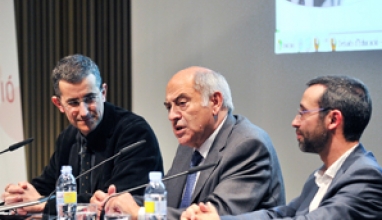
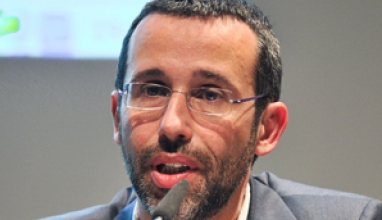
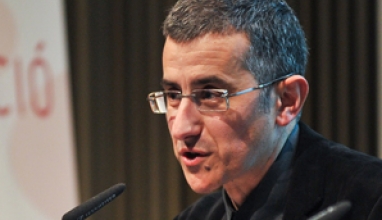
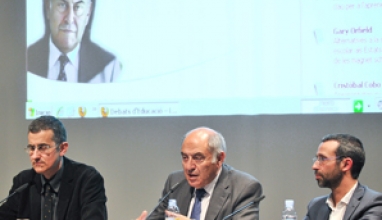
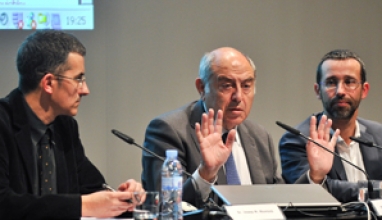
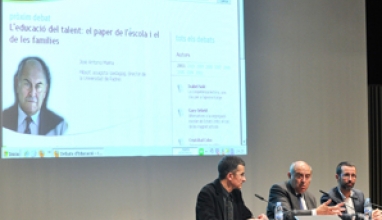
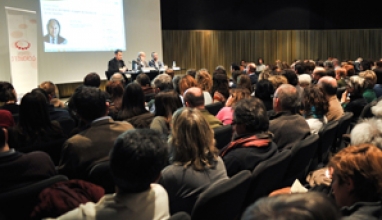








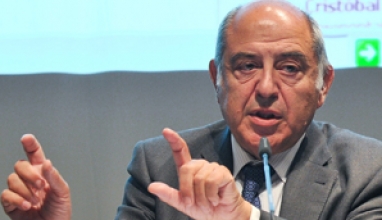


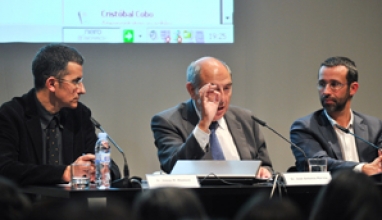



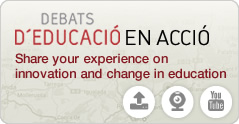
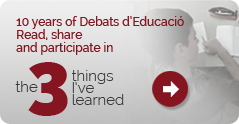

 The texts published on this website are, unless otherwise indicated, covered by the Creative Commons Spain Attribution - Non Commercial - No Derivs 3.0 licence. You may copy, distribute and transmit the work, provided you attribute it (authorship, journal name, publisher) in the manner specified by the author(s) or licensor(s). You may not use the material for commercial purposes. You may not transmit any derivative work from this material. The full text of the licence can be consulted here:
The texts published on this website are, unless otherwise indicated, covered by the Creative Commons Spain Attribution - Non Commercial - No Derivs 3.0 licence. You may copy, distribute and transmit the work, provided you attribute it (authorship, journal name, publisher) in the manner specified by the author(s) or licensor(s). You may not use the material for commercial purposes. You may not transmit any derivative work from this material. The full text of the licence can be consulted here: